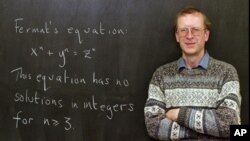A British mathematician has won the Abel Prize in math for solving an ancient math theorem.
On Tuesday, Andrew Wiles was given the award, which is considered the Nobel Prize of math, by Norway’s Academy of Science and Letters.
The academy said Wiles was chosen "for his stunning proof of (French mathematician Pierre de) Fermat's Last Theorem by way of the modularity conjecture for semi-stable elliptic curves, opening a new era in number theory."
Wiles solved the problem in 1994 at the age of 62. Fermat's Last Theorem, posited in 1637, "was the most famous, and long-running, unsolved problem in the subject's history."
Wiles told The Guardian newspaper that he discovered the theorem at the age of 10.
"What amazed me was that there were some unsolved problems that someone who was 10 years old could understand and even try. And I tried it throughout my teenage years," Wiles told The Guardian. "When I first went to college I thought I had a proof, but it turned out to be wrong."
Wiles' work has been described as an “epochal moment” and has allowed researchers to advance the study of mathematics in new ways.
In addition to the prestige, Wiles will receive $710,000 at the award ceremony May 24 in Oslo.









